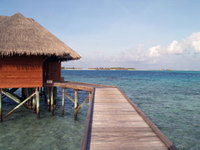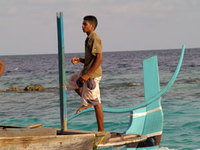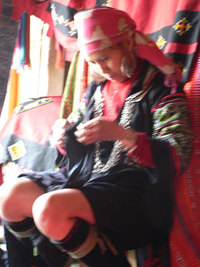
Paradisal Maldives may not be too idyllic by the turn of the century
In the race to ride the wave of luxury tourism, do builders think return of investment or return to nature? Plans are drawn for a magical resort in the Maldives, and investors want it up quick to hear the dollars rustle. Forget about the environment – too costly, complicated and hey, it’s not our responsibility anyway.
Fast-forward eighty years; the multi-million dollar investment is buried under the seas, along with their dreams and holidaymakers.
Tourism has certainly played an important role in the economic development of many countries. Luxury travel, in particular, has fueled an increase of alternative forms of resort and spa developments, benefiting shareholders and tax masters alike.
Sadly, it has also led to forests being destroyed, coastlines marred by proliferation of hotels, over development of infrastructure, wearing out of archaeological sites, depletion of natural resources and crumbling heritage.

Rising waters, warmer climates are issues faced by Maldivians
Despite tourism being regulated by government-drawn territorial plans, hoteliers and property developers still adopt a myopic view in designing luxury stays, causing irreparable damage to the environment. It’s a fact that global warming, caused by excessive carbon emissions, is to blame for the freaky weather and climate change we have seen, from El Nino, fatal heat waves to snowy blizzards in springtime.
The last century has seen the earth becoming warmer by 1%. The Intergovernmental Panel on Climate Change predicted that global warming would cause the world’s temperature to rise by 1.1-6.4ºC by 2100. The sea level rose on average by 1.8mm a year from 1961 to 2003, but went up further by 3.1mm average yearly between 1993 and 2003.
Ignorance is no longer an excuse for hoteliers, with information on protecting the earth being readily available and associations to consult on how to preserve the good during land transformation.

Local trade in ethnic handicrafts has Victoria Resort's support in Vietnam and Cambodia
Hoteliers and property developers have a part to play in sustainable tourism. This, in short, means what we take should be matched by what we put in. Former World Bank economist Herman Daly says, “The pace and rhythm of exploitation should be equal to the speed with which such resources are regenerated, while on the other hand the pace at which waste products are produced should reflect the natural capacity of ecosystems and the environment to absorb such substances.”
There are a few exemplary hotels that have taken eco-luxury to heart. The Four Seasons Resort in Costa Rica kept 70% of its land area to remain in a natural state and uses a type of grass for its golf course that conserves fresh water, using 50% ocean-water mix for irrigation.
The Crosswaters Ecolodge and Spa in the Nankun Mountain Reserve, Guangdong province has villas built of locally grown bamboo and uses organic local textiles. Built as a model of sustainable design, the lodge provides spa treatments in open-air suites and runs tai chi classes in forest studio.
French-run Victoria Resorts in Cambodia and Vietnam weave local art and trade within their resorts, with artists crafting their ware for display and sale. This is to preserve ethnic heritage and to stimulate further trade for the residents. Their website is www.victoriahotels-asia.com.
Malikha Lodge, built in the Himalayan foothills of Northern Myanmar, used glut materials like old teak for its handcrafted bathtub so as to preserve the endangered teak supplies. Bathroom tiles were handmade river stones hacked to shape by local jade cutters.
Not enough hoteliers, though, are taking the route of eco-luxury, especially in Asia. As consumers we can play a part in promoting eco-luxury. We can seek out hotels and resorts that are environmentally sensitive, use renewable energy and water, recycled building materials and have safe waste disposal systems. By selecting lodgings that pay attention to local traditions, we also help preserve its culture and heritage.
Creature comforts must be balanced by a thought for the environment, if we want our great grandchildren to be able to ride that luxury wave in the Maldives.